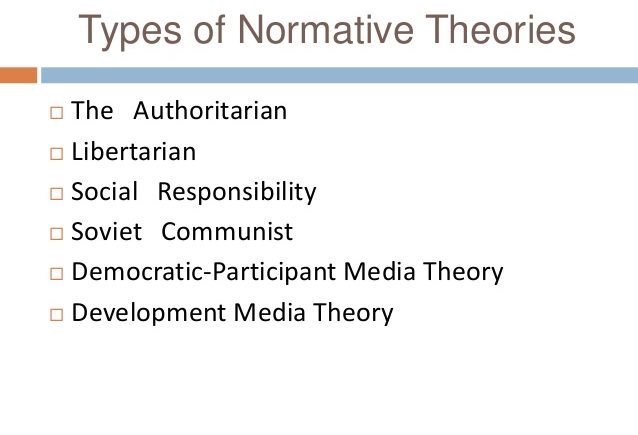Chapter#5: NORMATIVE THEORIES OF MASS COMMUNICATION
During the era of yellow journalism, most media professionals cared very little for the niceties of accuracy, objectivity, and public sensitivities. But in the first decades of the twentieth century, a crusade began among some media industry people and various social elites to clean up the media and make them more respectable and credible. The watchword of this crusade was professionalism, and its goal was elimination of shoddy and irresponsible content. Some sort of theory was needed to guide this task of media reform. The goal of this theory would be to answer questions such as these:
- Should media do something more than merely distribute whatever content will earn them the greatest profits in the shortest time?
- Are there some essential public services that media should provide even if no immediate profits can be earned?
- Should media become involved in identifying and solving social problems?
- Is it necessary or advisable that media serve as watchdogs and protect consumers against business fraud and corrupt bureaucrats?
- What should we expect media to do for us in times of crisis?
Radical Libertarianism: The absolute belief in Libertarianism’s faith in a good and rational public and totally unregulated media.
THE ORIGIN OF NORMATIVE THEORIES OF MEDIA
First Amendment absolutists Those who believe in the strictest sense that media should be completely unregulated.
Technocratic control direct regulation of media, most often by government agency or commission.
Social responsibility theory A normative theory that substitutes media industry and public responsibility for total media freedom on the one hand and for external control on the other.
THE ORIGIN OF LIBERTARIAN THOUGHT
Authoritarian theory A normative theory that places all forms of communication under the control of a governing elite or authorities.
Self-righting principle Milton’s idea that in a fair debate, good and truthful arguments will win out over lies and deceit.
John Keane (1991) identified three fundamental concepts underpinning the Founders’ belief in press freedom:
- Theology: media should serve as a forum allowing people to deduce between good and evil.
- Individual rights: press freedom is the strongest, if not the only, guarantee of liberty from political elites.
- Attainment of truth: falsehoods must be countered; ideas must be challenged and tested or they will become dogma.
THE MARKETPLACE OF IDEAS: A NEW FORM OF RADICAL LIBERTARIANISM
Marketplace of ideas In Libertarianism, the notion that all ideas should be put before the public, and the public will choose the best from that “marketplace”.
Laissez-faire doctrine The idea that government shall allow business to operate freely and without official intrusion
GOVERNMENT REGULATION OF MEDIA
During the 1920s and 1930s, a new normative theory of mass communication began to emerge that rejected both radical Libertarianism and technocratic control.
PROFESSIONALIZATION OF JOURNALISM
Fourth Estate Media as an independent social institution that ensures that other institutions serve the public.
SOCIAL RESPONSIBILITY THEORY
Despite little revamping or reexamination, social responsibility theory remains the normative theory guiding most media operation in the United States today. But recent changes in media technology and world politics make it reasonable to reassess social responsibility theory’s usefulness as currently applied. New media such as niche cable channels and LPFM are available to ethnic or other minority groups at low cost, and the Internet has made it possible for even the smallest groups to enter their voices into the marketplace of ideas. But some critics see the rise of many such small groups as a Balkanization of the larger U.S. culture. Before we can judge the validity of this worry, however, the normative theory on which our media system is grounded must be reformulated, especially given technological and economic changes reshaping the media. This will require a critical reexamination of social responsibility theory and careful consideration of alternatives.
Alternative normative theories, however, already exist, although they may not be a good fit for our political and social system. Developmental media theory advocates media support for an existing political regime in its efforts to foster national economic development. Democratic participant theory advocates media support for grassroots cultural pluralism. Hachten offered five concepts:
(1) Western, combining Libertarian and social responsibility ideals;
(2) Development, something akin to developmental media theory;
(3) Revolutionary, in which the people and media professionals use mass media to challenge an existing regime; and
(4) Authoritarian and
(5) Communism, in which media serve the dictates of those in power. Recently, however, there have been calls for a less category-based and more flexible approach to normative theories, a transitional media approach to evaluating a given society’s media system.
